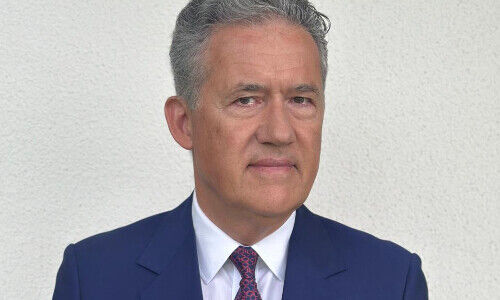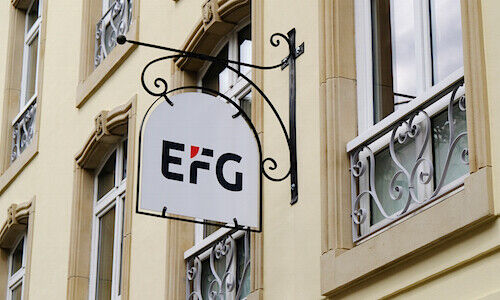Beat Wittmann: «10 Insights on Switzerland’s National Security»
The year 2025 will be unpredictable and full of surprises, particularly against the backdrop of the future Trump administration. This makes it imperative to think the unthinkable in geopolitics, economics, and technology. Under these conditions, the Swiss government and parliament must ensure a credible national defense, Beat Wittmann writes in his essay for finews.first.
In this section, authors comment on economic and financial topics.
«Russia’s war of aggression against Ukraine has turned into a war of attrition with no end in sight. Russia remains determined to continue the war, and its military potential will increase further in the coming months». This assessment is articulated with clarity, precision, and accuracy in the Swiss Federal Intelligence Service's (FIS) situation report «Security Switzerland 2024», issued on October 22, 2024.
NATO and the EU in Brussels share a similar perspective on Europe’s security situation. Meanwhile, Donald Trump has been elected in the US and is pressuring NATO partners in Europe to raise their defense budgets from the current 2 percent of GDP to as much as 5 percent.
«This makes Switzerland the largest free rider in Europe»
In this context, the Swiss parliament has taken an unprecedented inward-looking approach to security policy, committing to increase defense spending from 0.8 percent to 1 percent of GDP by 2032. This decision positions Switzerland as the largest security-policy free-rider in Europe, an internationally untenable stance that will soon face significant criticism.
The degree of denial shown by the government and parliament in Bern regarding security policy is alarmingly reminiscent of the self-inflicted collapse of Credit Suisse (CS), Switzerland’s major bank.
The same toxic combination of factors appears to be at play in the political sphere: professional incompetence, systemic conflicts of interest, ignorance of international contexts and dependencies, unholy alliances between far-left and far-right parties, prioritization of particular interests like subsidies, silo thinking, and structural failures in collaborative tasks, lack of transparency through «non-meetings,» abuse of authority, and misleading the public.
«Only this way can investments in defense be de-stigmatized»
National security, as the foundation of sovereignty, prosperity, and a secure future, is the most fundamental and critical responsibility for any state – including Switzerland. National security not only means a ready and capable army but encompasses politics, the economy, and critical infrastructures such as energy supply and cybersecurity.
In EU member states, defense financing needs are projected to reach €500 billion over the next five years. Meeting these significant demands necessitates both consolidating the fragmented defense industry to enhance cost-efficiency and effectiveness and reaching a consensus on national budget planning and the issuance of European defense bonds.
Private investment capital will need to be mobilized on a large scale. Persuading investors and civil society is essential to de-stigmatizing defense investments.
«A strong defense industry is part of national security»
Small and medium-sized enterprises (SMEs) and startups are critical for innovations and the mass production of drones, electronic warfare systems, and military reconnaissance tools. In this field, Switzerland, with its globally leading universities ETH in Zurich and EPFL in Lausanne, is strongly positioned.
A robust defense industry is an integral component of national security. The aim is to achieve strategic autonomy in small arms and ammunition, ensure partial production, maintenance, and repair of complex systems such as artillery, fighter jets, and anti-aircraft missiles, and build and commercialize an ecosystem of ETH/EPFL, startups, and RUAG for future technologies.
A concrete and urgent step in this direction is to amend the War Materiel Act to enable exports to democratically governed countries.
«Modern military conflicts are multidimensional and transnational»
Geopolitics fluctuates between «Yalta,» an order based on spheres of influence determined by the strongest powers, and «Helsinki,» a multilateral order guided by democracy and human rights.
Modern military conflicts are multidimensional and transnational, spanning land, air, outer space, seas, and cyberspace. As a globalized small state geographically located at the heart of Europe and part of the Western community of values, Switzerland critically needs close cooperation with the EU, the G7 nations, and NATO.
«Victory will go to the most adaptable»
The year 2025 will be unpredictable and full of surprises, especially given the future Trump administration. This underscores the need to think the unthinkable in geopolitics, economics, and technology.
Dictatorships and democracies alike will face collapse, nuclear proliferation will continue, and advancements in energy supply, quantum computing, and artificial intelligence (AI) will increasingly be applied in warfare. Ultimately, in line with Charles Darwin’s theory of evolution, the victor will be the most adaptable.
Beyond these challenges, the government and parliament are constitutionally mandated and compelled to ensure a credible national defense. For the sake of transparency and democratic accountability, a crucial and overdue step would be to summon the heads of the Federal Department of Defense, Civil Protection, and Sport (DDPS), the Swiss Army, and the FIS for a parliamentary hearing coinciding with the FIS' annual situation report – and to broadcast this hearing live to the public.
Beat Wittmann has been chairman and partner of Zurich-based financial advisory firm Porta Advisors for over eight years. His more than 30-year career in Swiss banking includes stints at both UBS and Credit Suisse as well as Clariden Leu and Julius Baer. He operated his own firm from 2009 to 2015, first independently and more recently under the Raiffeisen Group.
Previous texts by: Rudi Bogni, Rolf Banz, Werner Vogt, Walter Wittmann, Alfred Mettler, Robert Holzach, Craig Murray, David Zollinger, Arthur Bolliger, Beat Kappeler, Chris Rowe, Stefan Gerlach, Nuno Fernandes, Richard Egger, Dieter Ruloff, Marco Bargel, Steve Hanke, Urs Schoettli, Maurice Pedergnana, Stefan Kreuzkamp, Oliver Bussmann, Michael Benz, Albert Steck, Martin Dahinden, Thomas Fedier, Alfred Mettler, Brigitte Strebel, Mirjam Staub-Bisang, Kim Iskyan, Stephen Dover, Denise Kenyon-Rouvinez, Christian Dreyer, Kinan Khadam-Al-Jame, Robert Hemmi, Anton Affentranger, Yves Mirabaud, Hans-Martin Kraus, Gérard Guerdat, Mario Bassi, Stephen Thariyan, Dan Steinbock, Rino Borini, Bert Flossbach, Michael Hasenstab, Guido Schilling, Werner E. Rutsch, Dorte Bech Vizard, Maya Bhandari, Jean Tirole, Hans Jakob Roth, Marco Martinelli, Thomas Sutter, Tom King, Werner Peyer, Thomas Kupfer, Peter Kurer, Arturo Bris, Frédéric Papp, James Syme, Dennis Larsen, Bernd Kramer, Armin Jans, Nicolas Roth, Hans Ulrich Jost, Patrick Hunger, Fabrizio Quirighetti, Claire Shaw, Peter Fanconi, Alex Wolf, Dan Steinbock, Patrick Scheurle, Sandro Occhilupo, Will Ballard, Nicholas Yeo, Claude-Alain Margelisch, Jean-François Hirschel, Jens Pongratz, Samuel Gerber, Philipp Weckherlin, Anne Richards, Antoni Trenchev, Benoit Barbereau, Pascal R. Bersier, Shaul Lifshitz, Ana Botín, Martin Gilbert, Jesper Koll, Ingo Rauser, Carlo Capaul, Markus Winkler, Thomas Steinemann, Christina Böck, Guillaume Compeyron, Miro Zivkovic, Alexander F. Wagner, Eric Heymann, Christoph Sax, Felix Brem, Jochen Möbert, Jacques-Aurélien Marcireau, Ursula Finsterwald, Michel Longhini, Stefan Blum, Nicolas Ramelet, Søren Bjønness, Gilles Prince, Shanu Hinduja, Salman Ahmed, Peter van der Welle, Ken Orchard, Christian Gast, Jürgen Braunstein, Jeffrey Vögeli, Fiona Frick, Stefan Schneider, Matthias Hunn, Andreas Vetsch, Mark Hawtin, Fabiana Fedeli, Kim Fournais, Carole Millet, Swetha Ramachandran, Thomas Stucki, Neil Shearing, Tom Naratil, Oliver Berger, Robert Sharps, Tobias Müller, Florian Wicki, Jean Keller, Niels Lan Doky, Johnny El Hachem, Judith Basad, Katharina Bart, Thorsten Polleit, Peter Schmid, Karam Hinduja, Zsolt Kohalmi, Raphaël Surber, Santosh Brivio, Mark Urquhart, Bruno Capone, Peter Hody, Agniszka Walorska, Thomas Müller, Ebrahim Attarzadeh, Marcel Hostettler, Hui Zhang, Angela Agostini, Guy de Blonay, Tatjana Greil Castro, Jean-Baptiste Berthon, Dietrich Grönemeyer, Mobeen Tahir, Didier Saint-Georges, Serge Tabachnik, Vega Ibanez, David Folkerts-Landau, Michael Welti, Mihkel Vitsur, Roman Balzan, Todd Saligman, Stuart Dunbar, Carina Schaurte, Birte Orth-Freese, Gun Woo, Lamara von Albertini, Ramon Vogt, Andrea Hoffmann, Niccolò Garzelli, Darren Williams, Benjamin Böhner, Mike Judith, Jared Cook, Henk Grootveld, Roman Gaus, Nicolas Faller, Anna Stünzi, Thomas Höhne-Sparborth, Fabrizio Pagani, Guy de Blonay, Jan Boudewijns, Sean Hagerty, Alina Donets, Sébastien Galy, Roman von Ah, Fernando Fernández, Georg von Wyss, Stefan Bannwart, Andreas Britt, Frédéric Leroux, Nick Platjouw, Rolando Grandi, Philipp Kaupke, Gérard Piasko, Brad Slingerlend, Dieter Wermuth, Grégoire Bordier, Gianluca Gerosa, Michael Bornhäusser, Christine Houston, Manuel Romera Robles, Fabian Käslin, Claudia Kraaz, Marco Huwiler, Lukas Zihlmann, Sherif Mamdouh, Harald Preissler, Taimur Hyat, Philipp Cottier, Andreas Herrmann, Camille Vial, Marcus Hüttinger, Serge Beck, Alannah Beer, Stéphane Monier, Ashley Semmens, Lars Jaeger, Shanna Strauss-Frank, Bertrand Binggeli, Marionna Wegenstein, George Muzinich, Jian Shi Cortesi, Razan Nasser, Nicolas Forest, Jörg Rütschi, Reto Jauch, Bernardo Brunschwiler, Charles-Henry Monchau, Nicolas Ramelet, Ha Duong, Teodoro Cocca, Jan Brzezek, Nicolas Mousset, Beat Weiss, Pascal Mischler, Andrew Isbester, Konrad Hummler, Jan Beckers, Martin Velten, Katharine Neiss, Claude Baumann, Daniel Roarty, Kubilaqy Yalcin, Robert Almeida, Karin M. Klossek, Marc Taverner, Charlie T. Munger, Daniel Kobler, Patrick Stauber, Anna Rosenberg, Judith Wallenstein, Adriano Lucatelli, Daniel Goleman, Val Olson, Brice Prunas, Frances Weir, Luis Maldonado, Francesco Magistra, Nadège Lesueur-Pène, Massimo Pedrazzini, Eric Sarasin, Dina Ting, Christopher Gannatti, Shaniel Ramjee, Mihkel Vitsur, Nannette Hechler-Fayd'herbe, Ralph Ebert, Mark Denham, Francesco Mandalà, Mariolina Esposito, Maryann Umoren Selfe, Dominique Gerster, Christian Kälin, Nadège Dufossé, Benjamin Melman, Brigitte Kaps, Florin Baeriswyl, Marc Reinhardt, Thomas Holderegger, Beat Wittmann, Bruno Cavalier, Gary Burnison, Louise Curran, Adrian Cox, Philip Adler, Serge Fehr, Marc Lussy, Axel Brosey, Colin Vidal, Vivien Jain, Ralf Zellweger, Maria Vassalou, Nico Fiore, Gary Burnison, Thomas Signer, Brigitte Kaps, Andreas Ita, Jacques-Aurélien Marcireau, Leon Curti, Remo Badertscher, Alexis Marinof, and Olivier Kessler.



























